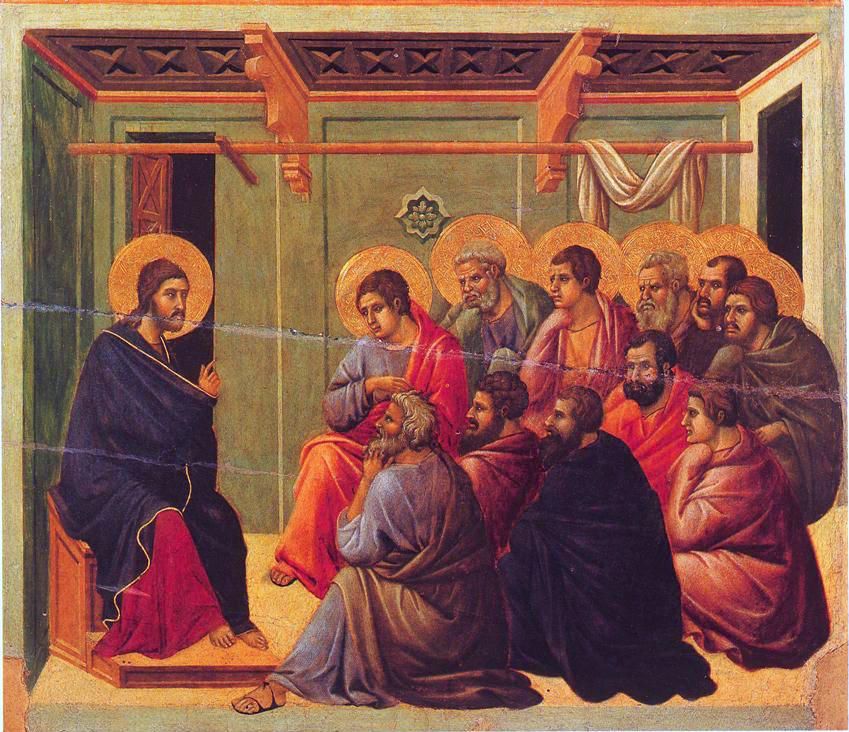

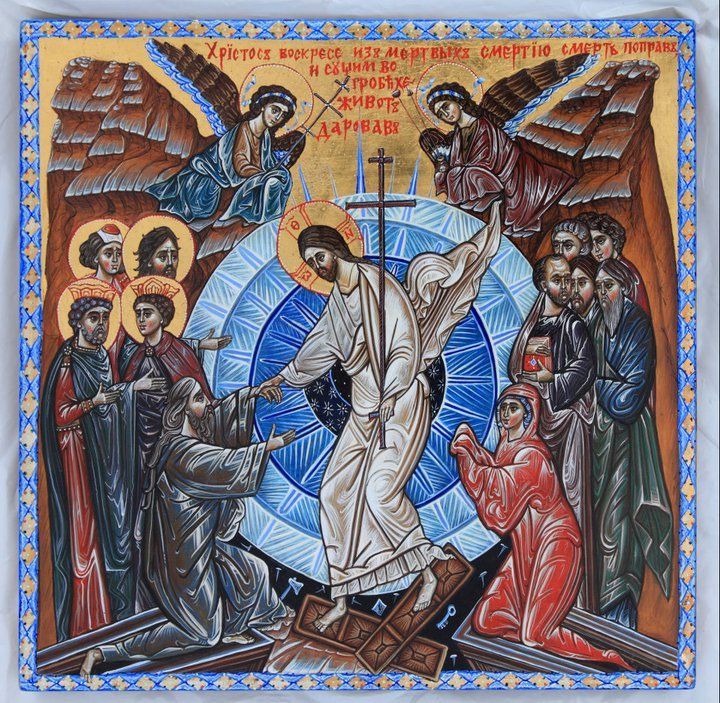

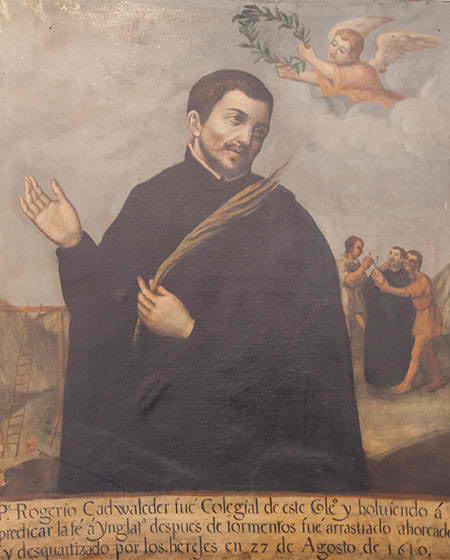
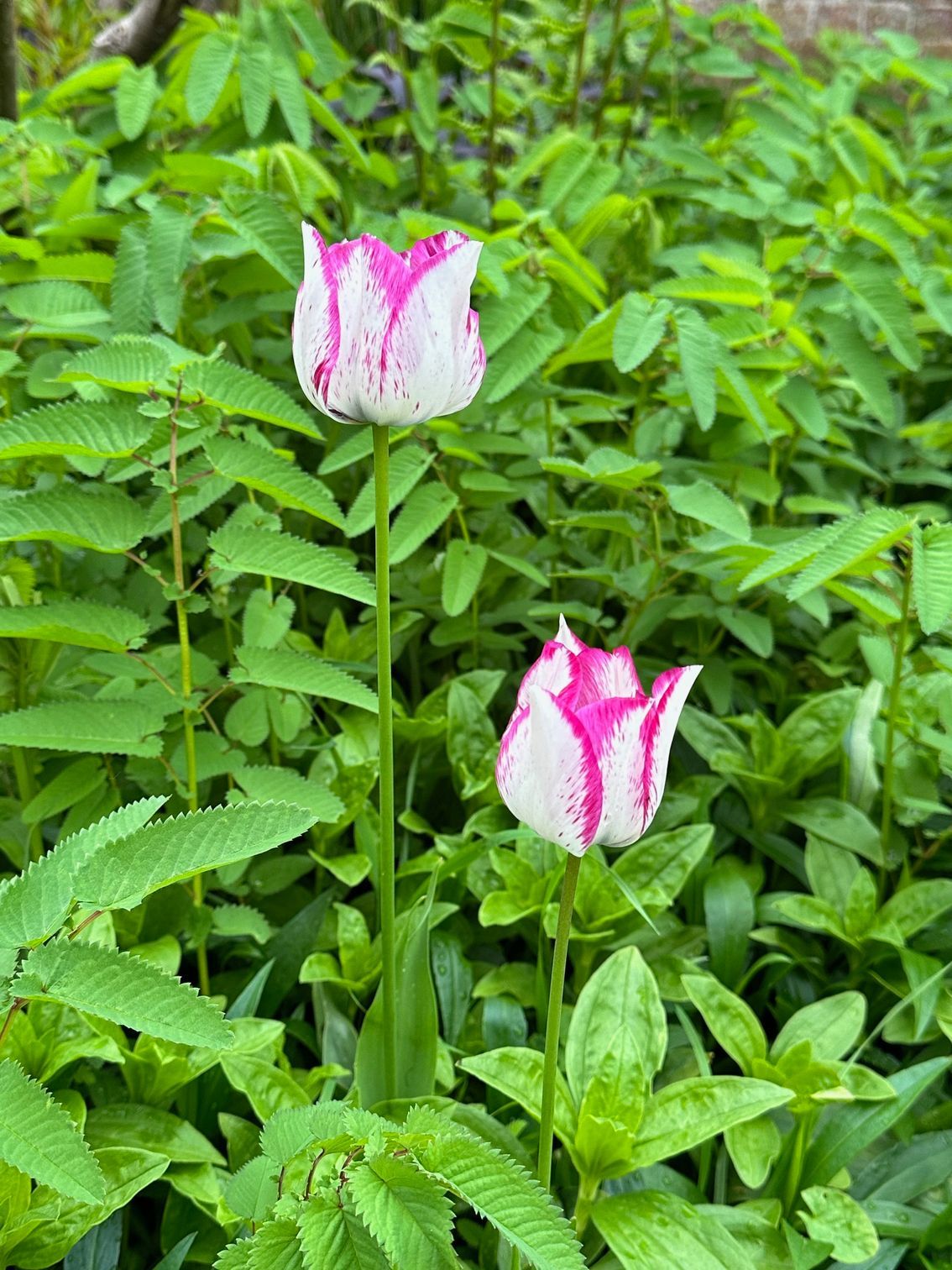
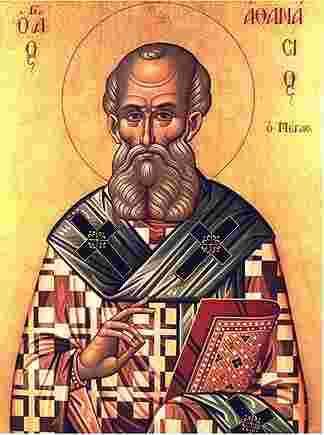

You will have noticed the recurrence of certain words in today’s Requiem Mass for Fr Aelred: in the hymns and chants the repeated Alleluias and in all the texts mention of joy and joyfulness, friend and friendship. Written on his memorial card you will find that lovely text from St Aelred’s Treatise on Spiritual Friendship, which contains the phrase that, for many of us, sums up our experience of Fr Aelred in a few words, “a friend who meets every misfortune joyfully”. That is the story of his life, “a friend who meets every misfortune joyfully”, because he had a deep, unshakable faith in Jesus Christ as Lord and Saviour.
Fr Aelred made the words of the prophet Isaiah his own, “The Lord is the one in whom we hoped. We exult and rejoice that he has saved us.” His life vibrated with the words of St Paul, “Hope is not deceptive, because the love of God has been poured into our hearts by the Holy Spirit which has been given to us.” That hope and love were quite tangible in Fr Aelred, due, no doubt, to his intimate friendship with Jesus, forged in suffering and prayer over sixty years of monastic life. There were moments of real crisis and sincere conversion, but ultimately his love for God and God’s love for him touched his brethren at Belmont and at Tororo and his many friends throughout the world. Aelred, like all of us, suffered from physical, mental and emotional difficulties and setbacks throughout his life, but he was “a friend who meets every misfortune joyfully”, always trusting in God, always living in joyful hope, never forgetting that the most important thing in life is our friendship with the Lord. He was a great man of prayer. The morning he died he received Holy Communion, as he did every day, and he fell asleep in the Lord with his rosary beads held tightly in his hand.
Raymund David Cousins was born in Cardiff on 2nd October 1924, the eldest of four children. His father was of Welsh Presbyterian stock and his mother a lapsed Catholic. It was his Aunt Teresa, a staunch Catholic, who said to his mother in the street, “If you don’t get that baby baptised, it will go straight to hell.” Frightened out of her wits, his mother took him straight to St Mary’s, Canton, where a good Benedictine of Ampleforth baptised him, no questions asked. The upshot was that his mother returned to the faith and all four children were brought up as Catholics.
From Lansdown Road School he passed the eleven plus to St Illtud’s College and, on leaving, he did military service as a surveyor in the Royal Artillery. He served in France but, because of ill health and an operation for cancer, he was demobbed towards the end of the war. It was Fr Roger Lightbound who suggested that he should come to Belmont, where his brother, Fr Anselm, was a monk. He entered the novitiate in September 1946, three months after Fr Luke and three months before Abbot Jerome, being clothed and professed by Abbot Aidan Williams. His novice master was Fr Benedict Adams, who noted that Br Aelred was the nearest thing to the perfect novice. Philosophy and theology were done in-house and at the same time he attempted an external degree in Mathematics by correspondence course. All this was too much for him, he got sick and did not get the degree. He was ordained a priest together with Fr Peter Fell by Archbishop McGrath on 25th April 1954. After ordination he was sent to Oxford, where he gained an MA in History. However, his first love was always Maths.
In 1957 he became a housemaster and taught full-time in the school. He was also put in charge of a good many activities. I quote from the letter of an Old Boy. “In my day there was plenty of opportunity to get used to his often eccentric ways of dealing with his charges: he was House Master of Kemble, organiser of the CCF, the Rowing and the D of E Award scheme, as well as teaching Maths and coaching the 2nd XV.” I’m afraid to say that in those days Belmont worked its monks into the ground, men who had no more professional training for the job than a degree. But it was the same everywhere. Aelred was a strict disciplinarian, his use of the cane seeming savage to some. Times have changed and it would be unfair to judge what was acceptable then by today’s more enlightened standards of good practice. To quote that same Old Boy, “My love of Maths, adventure, water sport and the great outdoors is due in no small part to Fr Aelred, an unforgettable character.”
By 1967 it was obvious that both he and the school needed a change, so Aelred was sent to Africa on a sabbatical. He taught Maths at St Mary’s College, Kisubi, the finest boys’ school in Uganda. At the end of the year he was told rather offhandedly by Abbot Robert that he could not return to Belmont. Naturally, he was very upset and felt rejected by the Abbot and Head Master, but he met this misfortune joyfully and dedicated himself to teaching in Uganda. After four years at Kisubi in the north, he moved south near the border with Burundi to Kitowu College, Masaka, a school of 1,200 boys. It was here that he swam in the crocodile-infested waters of Lake Victoria and came into frequent contact with the black mambo, the world’s most dangerous snake, for someone of Aelred’s nervous disposition not the best situation to be in. He also caught malaria, which would recur at frequent intervals. It was here that he became a close friend of the Medical Missionaries of Mary. At Kitowu he continued to teach 6th form Maths, but also ran a Vocations class. Many priests and religious in Uganda today discovered their vocation under Aelred’s guidance.
1972 was a difficult year for Uganda, a year of brutal massacre and murder at the hands of Idi Amin and his followers. Aelred almost became a martyr, hiding for three days under the altar with nothing but a rosary to protect him. He escaped to Kenya and made his way back to the UK via Rome. As a stopgap measure, Abbot Jerome appointed him to St David’s, Swansea, as curate to Fr Peter. Yet again Fr Aelred met misfortune joyfully and endeared himself to his fellow Welshmen and women with his long but entertaining sermons and avant-garde liturgical practices. By 1974 he was able to return to Uganda and now there was no looking back.
He continued teaching, but life is never uneventful in the tropics. The founding of the Monastery of Christ the King at Tororo is a strange and complicated story, best told elsewhere. Fr Aelred returned to Belmont in December 1981 and, while at Belmont, received a letter from Fr John Neudegger inviting him to go to Tororo, where the monks of St Ottilien were about to make a foundation. On 21st November 1982 Aelred replied, “Abbot Jerome has given me the green light. I return to Africa where my heart undoubtedly is.” The monastery formally began on 7th March 1983 with Fr John as superior, Fr Aelred as novice master and four aspirants. He also became chaplain to the Benedictine nuns, whom he served faithfully for 16 years. Aelred was to remain at Tororo until 1999, when a breakdown in his health caused by physical exhaustion, nervous strain, malaria and, let’s be honest, too much John Walker forced him to return to Belmont. But yet again he would meet misfortune joyfully.
Today Tororo is a flourishing, independent community, not without its problems as any other community. I quote from a letter of Fr Pius Muehlbacher, who was superior after Fr John. “Dom Aelred has left his handwriting in the community of Tororo, and he is remembered by many, many people, former students of his in the whole of Uganda. He has contributed to the inner growth of the community, and we are grateful for that.” Indeed, if the monastery of Tororo exists today, it is due in great part to Aelred’s faith, tenacity and perseverance. To go back to St Paul, “Hope is not deceptive because the love of God has been poured into our hearts by the Holy Spirit which has been given to us.” Aelred never lost hope in God or in his beloved Ugandan brethren. He really loved them and they loved him. What is a monastery built on if not the love of the brethren? Remember what Jesus told us in the Gospel today. “You did not choose me, no, I chose you; and I commissioned you to go out and to bear fruit, fruit that will last; and then the Father will give you anything you ask him in my name. What I command you is to love one another.”
So in August 1999, after 16 years as novice master, Fr Aelred returned to England. He returned a sick man, exhausted and weak, and yet again he was able to meet misfortune joyfully. He missed Uganda and its people and the brethren at Tororo desperately. He was genuinely homesick and longed to return to Africa. Yet, as a good monk, he knuckled under and coped as best he could through prayer and reading and his devotion to the Mass and the Divine Office. He did his best to take part in community life, such as it is at Belmont when compared to the excitement and youthful vigour of an African foundation.
These last six years were ones of gradual and, at times, distressing diminishment. However, apart from the occasional bad patch, he was able to take part in the Conventual Mass and most of the Divine Office and he was always up early. You will remember what good form he was on for his Golden Jubilee. He kept up his reading, devouring the Times each morning and reading the Tablet from cover to cover. He enjoyed the occasional outing and visit to friends. He often tested the patience of the Community (We are not a particularly patient lot!), and especially of Br Bernard, who as infirmarian spent so much time with him and, towards the end, never left his side. He loved Mary Jo, whom strangers outside the monastery often took to be his wife and who, like any good woman, knows what monks want. It’s easy to joke, but the care of the sick takes up a lot of time and energy, so much so that St Benedict says in the Rule that there is nothing more important in a monastery than the care of the sick. On behalf of the Community I thank Mary Jo and Br Bernard and all those who helped care for Aelred in any way.
Now monastic tradition teaches us, and don’t forget that St Benedict is the patron of a happy death, that we come to the monastery to prepare for death. That is the whole point of a monk’s life, to live well in order to die well. Fr Aelred was certainly blessed in this regard. These past six years he exemplified those words of St Paul, “we are filled with joyful trust in God, through our Lord Jesus Christ.” Towards the very end the nervousness and anxiety of a lifetime faded away and he died a calm and peaceful man.
Do you know I have never ever heard Aelred criticising anyone. In spite of bitter disappointments and horrific experiences, ill health and apparent failure, he never lost that joyful trust in God. You could see it in his lovely, mischievous smile. He never lost that joie de vivre, even when he had to give up his pipe and glass of whiskey. Like many of us he had a sweet tooth and loved cakes and puddings and ice cream and fresh cream and, above all, bananas. Br Bernard was only saying last night, “I hope they put a banana in his coffin.” Well, what did Isaiah say? “On this mountain the Lord of hosts will prepare for all peoples a banquet of rich food.” That is how the Bible describes heaven, as “a banquet of rich food”.
Dear Aelred, thank you for everything you gave to Belmont and to Tororo. Thank you for showing us how God’s beauty and goodness and love can so often shine through difficult and painful human situations. And thank you for being a friend and a brother to so many people, “a friend who meets every misfortune joyfully”, “for, indeed, the best medicine in life is a friend”. You were the very best of friends, God’s friend and ours. May you now rest in peace. Amen.







